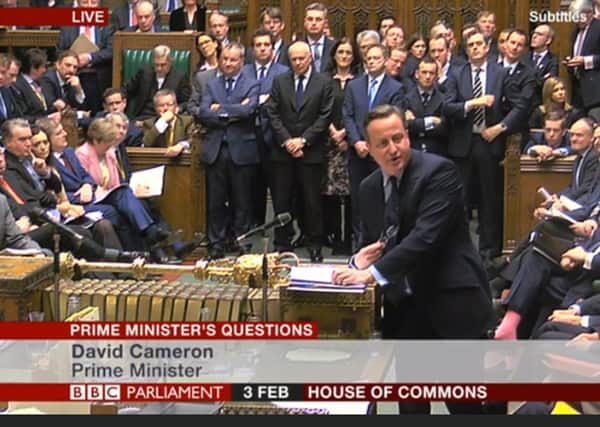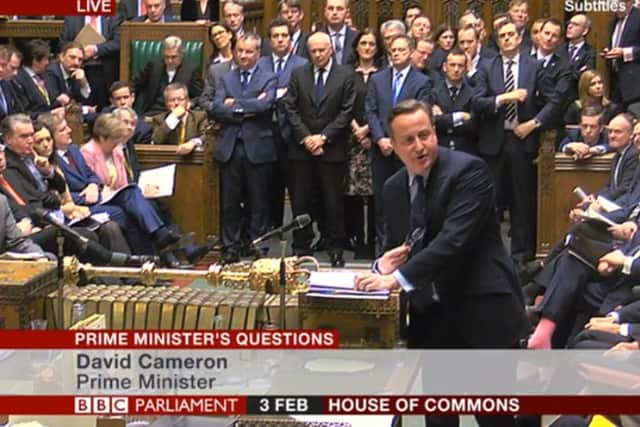The News takes ringside seat at Prime Minister's Questions


And yesterday The News was fortunate enough to have a ringside seat for the weekly spectacle known as Prime Minister’s Questions, where personalities shine and tempers flare in the historic setting of the House of Commons in London.
Getting into the Houses of Parliament was no simple task. The News was ushered through a gate protected by guards and police officers and down a path outside the Westminster estate, before being whisked into a room where an airport-style security operation was in full force.
Advertisement
Hide AdAdvertisement
Hide AdMore guards and police kept a watchful eye on the swarm of guests arriving to either take a tour of parliament’s sprawling buildings, catch up with their MPs or secure a seat at the upcoming PMQs session.


Once through, The News was led into the grand Westminster Hall, the oldest existing part of the Palace of Westminster, which was erected in 1097.
And then it was onwards through winding corridors leading to a myriad of rooms.
Staring up at the huge historic ceilings, it was hard not to be blown away by parliament’s splendid decor.
Advertisement
Hide AdAdvertisement
Hide AdBustling past were MPs from constituencies across the country, on their way to or from committee meetings or on their way back to their London office or digs.


And every corner you turned it seemed another guard or police officer was stood, highlighting raised fears over terrorism and the thought of parliament being declared a prime target.
After securing a pass to the public gallery in the House of Commons, The News was told to wait in a huddle with other guests in the main lobby and await the start of the Speaker’s procession before the beginning of PMQs.
The ceremonial march consists of a Commons’ Doorkeeper, the Serjeant at Arms with the mace, the Speaker, the Trainbearer, Chaplain and Secretary, and the procession moves from Speaker’s House through the Library Corridor, the Lower Waiting Hall, and through the central and members’ Lobbies to the main chamber.
Advertisement
Hide AdAdvertisement
Hide AdAnd then finally it was time. The News followed scores of other guests up a winding staircase, before coming out to a row of seats overlooking the benches where MPs began settling themselves and preparing for the quick-fire debate.
A glass screen separates the public gallery from the action, while side aisles without screens are reserved for more senior guests. A raised platform opposite the public gallery is reserved for senior members of the press.
As MPs filtered in, familiar faces appeared, including local representatives Havant MP Alan Mak – sat behind the front benches – Fareham MP Suella Fernandes and Portsmouth South MP Flick Drummond.
And then just before noon, Labour opposition leader Jeremy Corbyn and prime minister David Cameron took their places and the action roared to life.
Advertisement
Hide AdAdvertisement
Hide AdOn television, PMQs appears a lively, competitive affair, with all sides of the house cheering, jeering and shouting as MPs battle to get their questions into the prime minister. And that’s just how it is in the flesh.
The PM and opposition leader go head-to-head in a display of dominance – and the level of excitement, tension and passion in the bearpit is tangible.
The chamber and public galleries above were packed to the rafters as Mr Cameron addressed concerns on the economy, public health and welfare spending, how quickly cancer patients get access to care, cuts to their benefits and the defence budget.
It kicked off with veteran Labour MP John Mann riling the house by accusing Mr Cameron of offering ‘nothing for British pensioners, and nothing for British workers’.
Advertisement
Hide AdAdvertisement
Hide AdBut Mr Cameron was quick off the mark, declaring the government had imposed a ‘triple lock’ on pensions, and was providing financial incentives for people to get into work.
Mr Corbyn and Mr Cameron went back and forth about health cuts, the government’s commitment to spend more on the NHS and benefit cuts to the most vulnerable people. Mr Cameron drew approval from his party – and some members of the public – as he hit back saying Wales, run by Labour, had slashed NHS spending, and laughter erupted in the gallery as he joked Mr Corbyn should perhaps ‘get on the phone to them about it’.
Mr Corbyn then targeted cuts to disabled students’ allowances – saying a constituent called ‘Martin’ had contacted him this week to say how concerned he was that a friend with breast cancer was receiving less money. Mr Corbyn was mocked for referring to Martin – but he responded by saying: ‘It’s funny to many members, but not funny for Martin’.
The News was invited afterwards to a business lunch with Havant MP Alan Mak in a stunning room near the parliament chamber, which he explained was set aside especially for MPs with guests and other senior visitors to dine in.
Advertisement
Hide AdAdvertisement
Hide AdAnd he wasn’t wrong – just three tables away having lunch was justice secretary Michael Gove with a member of The Times newspaper. It was also pointed out that comic Jim Davidson was sat in a corner entertaining armed forces guests.
Mr Mak was in a confident mood as he reflected on the outcome of PMQs. He said: ‘The Chamber is packed every week, so I get up at 6am to ensure I get a seat. Noise levels and passions run high, but it shows Parliament at its most energetic and passionate.
‘I wouldn’t have it any other way.’
PARTY BUSINESS
THE prime minister unveiled revised proposals as part of the UK’s bid for a better deal as member of the European Union.
Addressing the House of Commons after Prime Minister’s Questions, David Cameron said ‘real progress’ was being made in ‘all areas’ of the re-structuring of the country’s membership of the EU ahead of a referendum over whether it should stay in or go.
Advertisement
Hide AdAdvertisement
Hide AdMr Cameron said a key part of the new proposals is the ability for the UK and other EU parliaments to give Brussels the ‘red card’ should it try and roll out new legislation they’re not happy with.
The prime minister also said he had no interest in becoming part of a ‘EU super state’ and declared: ‘We don’t want to have our country bond up in close political union with Europe.’ But Labour leader Jeremy Corbyn labelled the re-negotiation attempts a ‘Tory Party drama’.